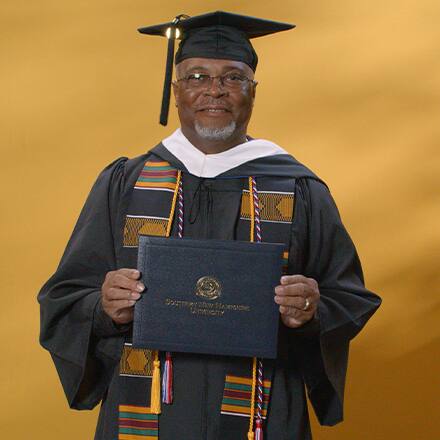Is a Communication Degree Worth It?

Understanding the Numbers
When reviewing job growth and salary information, it’s important to remember that actual numbers can vary due to many different factors — like years of experience in the role, industry of employment, geographic location, worker skill and economic conditions. Cited projections do not guarantee actual salary or job growth.
In the realm of academic majors, communication is one that can cover a wide range of professional fields.
From new media and public relations, to advertising and professional writing, to communication, broadcast and other arenas, a degree in communication can launch careers along any number of professional paths.
Given the broad scope of the communication major and the dynamic, rapidly evolving nature of many of the professional fields it typically feeds into, it only makes sense to take a deep dive into the academic discipline to make sure it’s the right direction for you and your career.
How Useful is a Communication Degree?
 A degree in communication in today’s professional landscape can be very useful, said Dr. Reginald Ecarma, an adjunct faculty member at Southern New Hampshire University (SNHU).
A degree in communication in today’s professional landscape can be very useful, said Dr. Reginald Ecarma, an adjunct faculty member at Southern New Hampshire University (SNHU).
“With all the miscommunication occurring in relationships, in the workplace, in society, in media and culture, trained communicators are worth more weight than gold,” said Ecarma, who has 15 years of experience in professional communications roles and authored a book about television news and media.
According to Ecarma, some of the professional fields in which your degree in communication can be a useful base include:
- Communications consultancy
- Journalism
- News reporting
- Public relations specialists
“As the communication professional builds credibility and trust, as well as expertise, their position becomes indispensable, and can become part of the management team,” Ecarma said.
Find Your Program
Are Communication Degrees Hard?
Studying communication isn’t as technically difficult as other areas like computer science, mathematics and science, Ecarma said, and focuses more on “soft skills” that includes things like:
- Communication strategies
- Effective human interaction
- Research and analysis
- Verbal and listening skills
Do Communication Majors Write a Lot?
![]() When it comes to the amount of writing you may do as a communication major, it depends on what areas of communication you’re most interested in and what your professional goals are, Ecarma said.
When it comes to the amount of writing you may do as a communication major, it depends on what areas of communication you’re most interested in and what your professional goals are, Ecarma said.
But, he said developing solid writing skills can enhance your career opportunities regardless of what specific area of communication you’re interested in. “It is best to be a clear and competent writer,” Ecarma said. “Clear writing reflects clear thinking and, in turn, helps in clear speaking."
Ecarma added that as important as it is to be a good writer as a communication professional, being a good listener is also essential. "An underrated skill is also being a good listener, which alleviates much miscommunication and interpersonal conflicts,” he said.
Are Communication Majors in High Demand?
According to the U.S. Bureau of Labor Statistics (BLS), employment in communications and media is projected to grow by approximately 114,300 job openings between 2022 and 2032.*
Ecarma said one of the things that makes communication majors attractive to future employers is the well-rounded skill set they bring in those “soft skill” areas. He noted that graduates who take initiative and successfully bring groups together through effective communication will be in high demand and well-positioned to advance in their careers.*
According to Forbes, some of the more common career fields in which you’ll find those with a communication degree include:
- Journalism – Including reporters, journalists, news editors, broadcast and radio announcers.
- Public relations – Including PR specialists, communications directors and social media managers.
- Marketing – Including market research analysts, marketing managers and marketing communication directors.
- Human resources – Including human resource managers, employee relations managers, staffing and payroll managers.
According to Ecarma, there are a variety of other areas and professional settings where you could be in high demand as a communication major.*
“They can work for hospitals as PR specialists, first responders as spokesperson, politics as communications director or speech writer, or in companies as consultants or representatives,” he said.
Are There Any New Fields for Those With a Communication Degree?
 The key skills gained as a communication major can be applied to a variety of new and emerging professional fields, as evidenced by SNHU graduate Michael Fertitta '23.
The key skills gained as a communication major can be applied to a variety of new and emerging professional fields, as evidenced by SNHU graduate Michael Fertitta '23.
A lifelong video game enthusiast, Fertitta paired his major in communication with a minor in esports. “Video games are an incredible and transformative work of art,” Fertitta said. “And I think that should be acknowledged a lot more.”
A 2023 report in The Economist identifies esports as a rapidly growing professional sports movement where accomplished video gamers from across the country and around the world gather to compete. While Fertitta knew that he likely didn’t have a future as an esports player, he wanted to remain close to the field in some capacity.
By majoring in communication at SNHU, he said he’ll be able to do just that as a broadcaster at esports events and tournaments.
“I would love to be in broadcast,” Fertitta said. "It’s just fascinating looking at all the equipment that goes into a broadcast — the audio, the video, the lighting. Renting out entire sports stadiums for esports, that spectacle is what I want to be able to work within.”
Will a Master’s Degree in Communication Take Me Further?
![]() Earning an advanced degree like a master’s in communication can be an effective way of opening new doors of opportunity, setting yourself apart and reaching even greater career heights.
Earning an advanced degree like a master’s in communication can be an effective way of opening new doors of opportunity, setting yourself apart and reaching even greater career heights.
In many master’s programs, you’ll find a robust selection of concentration areas as a way to tailor that experience around your specific academic and career goals.
Some courses and areas of concentration may include:
- Communication for Leadership
- Communication, Media & Society
- New Media and Marketing
- Public Relations
- Strategic Communication in a New Age
 Na’Keevia Brown '21G, an SNHU graduate who earned her master’s degree in communication with a new media and marketing concentration, is now working as an associate producer at CNN in Atlanta, Georgia. She said there were a number of aspects of her learning experience that stood out as particularly helpful.
Na’Keevia Brown '21G, an SNHU graduate who earned her master’s degree in communication with a new media and marketing concentration, is now working as an associate producer at CNN in Atlanta, Georgia. She said there were a number of aspects of her learning experience that stood out as particularly helpful.
“The 'Communication (with) Media Technology' class really stood out to me because it was so relevant to where we are today in this digital era,” Brown said. "Takeaways I feel I use frequently come from my 'Pen to Platform' class. I learned there how to apply best practices for effectively communicating across different media."
Discover more about SNHU's online bachelor’s in communication: Find out what courses you'll take, skills you'll learn and how to request information about the program.
*Cited job growth projections may not reflect local and/or short-term economic or job conditions and do not guarantee actual job growth. Actual salaries and/or earning potential may be the result of a combination of factors including, but not limited to: years of experience, industry of employment, geographic location, and worker skill.
Cary Jordan is an Iowa-based writer with more than 20 years of writing and editing experience on a wide range of issues related to higher education. Cary has held administrative and cabinet-level positions at multiple colleges and universities, and his writing has spanned topics related to undergraduate education as well as graduate education in the areas of business, law, medicine and engineering, among others.
Explore more content like this article

Why is Poetry Important? Celebrating National Poetry Month

Meet Betty White Stamp Artist Dale Stephanos, SNHU Graphic Design Grad

SNHU Spotlight: Dennis Peacock, BA in Graphic Design Grad
About Southern New Hampshire University

SNHU is a nonprofit, accredited university with a mission to make high-quality education more accessible and affordable for everyone.
Founded in 1932, and online since 1995, we’ve helped countless students reach their goals with flexible, career-focused programs. Our 300-acre campus in Manchester, NH is home to over 3,000 students, and we serve over 135,000 students online. Visit our about SNHU page to learn more about our mission, accreditations, leadership team, national recognitions and awards.

